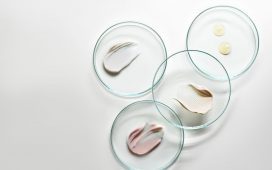There was a time in the early 2000s when it felt as though no public toilet was safe from the guerrilla stickering of Mooncup fans. Festivals, university loos, clubs and pubs – if someone could be sat with their knickers down, then the chances are there would be a little white sticker in front of them offering a “safer, greener, cheaper” period.
Except they didn’t use the word period back then. In 2002, when Mooncup – the world’s first reusable silicone menstrual cup – was launched by two women in Brighton, the word was still taboo. “People were revolted by what we were doing,” says Eileen Greene, one of the founders and directors of the company. “People really weren’t talking about periods at all. We were quite radical. We would do stalls at festivals and trade shows and we would call it the ‘repulsion zone’ – this semicircle around the stall where people wouldn’t even want to come near us.”
What a difference 17 years make. I meet Greene and Kath Clements – another of Mooncup’s directors, who joined in 2005, in their Brighton offices. They have outgrown the bedroom in the Whitehawk estate where the company was founded, when a team of two were cramped between piles of leaflets, cups and stickers. Now a 40-strong outfit, Mooncup has a proper office and a kitchen with a long wooden table, which is where the staff cook and eat a vegan lunch together every day. They do yoga here, too, and meditation. “It’s just what we’ve always done,” says Greene.
If you are unfamiliar with the Mooncup, think of it as a bendy silicone eggcup, that, when inserted into the vagina, collects menstrual blood. You can leave it in for around eight hours, because it holds about three times as much fluid as a regular tampon. When you take it out, you just tip the blood away, give it a rinse (a water bottle will do if you don’t want to use the public sink) and reinsert it. Each Mooncup lasts for about 10 years, so the £22 price tag should recoup itself after six months of saving on other sanitary products. I have a friend who has been using one since her teens and, now in her mid 30s, has only ever spent about £40 on her period in her whole life. Then, of course, there is the environmental benefit of ridding the world of the estimated 200,000 tonnes of sanitary waste that ends up in landfill in the UK each year.

And it is finally catching on. In the past five years, sales have risen by 98%. The story of the Mooncup is not just about the power of ethical business, but also word-of-mouth marketing in a sector that is dominated by multinational corporations. It has, after all, gone from a niche product sold in healthfood stores to being stocked in Boots and Asos.
This month marks a major turning point, too: for the first time since the product’s launch, the packaging has been redesigned to show the cup on the front of the box. “We’ve always had a white box with a flower on it,” says Greene. “Which was a way of saying: ‘Look, this isn’t a scary thing.’ Now, we feel able to be more up front.”
In the past decade there has been a dramatic cultural shift away from the hushed tones and euphemisms used for anything related to a woman’s menstrual cycle. “In 2015, you could really see the taboo around periods starting to break,” says Clements. She points to the tennis player Heather Watson saying that she performed poorly in the Australian Open because of her period and the musician Kiran Gandhi, who ran the London Marathon free bleeding, as key moments in changing public discourse around menstruation that year. “And we’d played our part in that – very committedly trying to shift the conversation around periods,” she says. But she emphasises that this is a shift restricted to the UK: “Because in many countries, it is not the case at all.”
The first menstrual cup was invented by an American actor, Leona Chalmers, who patented her runner cup in 1937. Greene stumbled on the idea in the late 1990s, when a woman on a Critical Mass bike ride through London told her about them. “I was like: ‘Wow, I’ve never heard of anything like that.’” A year later, Greene went travelling around Australia. “I was camping in Boonoo Boonoo national park and opposite me was this British family. There was a woman washing reusable nappies in a bucket – which you really didn’t see very often back then, and I was intrigued.” That woman was Su Hardy, whom Greene would tell about the menstrual cup. Hardy was so enthralled that, when she got back to the UK, she managed to track one down in the US. “At that time, they were fairly rudimentary rubber cups. She started importing them on a small scale, and selling then to friends of friends. They were OK, but some people had a reaction to the latex, so that got her thinking: ‘How can I improve this? And she came up with the idea of making it from medical-grade silicone instead. She made it a 21st-century product.”
By this point, Hardy had moved to Brighton and the fledgling business operated out of her house. “It was so chaotic,” says Clements. “You couldn’t even move your chair.” The stickers were Hardy’s idea. “Su’s one-woman crusade,” laughs Clements. “She was going around stickering public toilets. Every day, she’d run off to the post office with this wicker basket full of orders. Each Mooncup would come with a sticker, so our users started stickering, too.
“It’s such a different concept to the tampons and pads that we’ve all been used to using. People really need to hear it from someone else.”
There was a natural hesitance among consumers, whose relationship with tampon brands is often embedded in their school years. “I remember the Tampax lady coming into our school really fondly – which shows how clever they are about it,” says Clements. It must be galling, then, to see rival menstrual cups flooding a market that they created. How do they feel about Tampax launching its own menstrual cup? “They have clearly seen a commercial opportunity, that times are changing, and they’ve jumped on the bandwagon,” says Greene. Tampax’s product, however, not only comes in a plastic container, but plastic packaging, too. “You would have hoped they would focus on eliminating single-use plastic. That would be a diligent environmental approach, rather than just adding another product to the range.”
As for the other brands, Clements thinks it is worth cautiously celebrating that their efforts have “transformed the feminine hygiene aisle”. Yet she warns that companies should also be thinking about “where it’s being manufactured and if colours are being added to it. Also, I’ve seen some brands saying they need replacing every year, and some that come in plastic packaging.”

This distaste for waste is the reason Mooncup will not be expanding its range, says Greene. “We won’t make wipes or washes – those paraphernalia of consumerism – because they are simply not needed.”
When Hardy retired in 2014, she transferred ownership of the business to the employees. Even the salaries are shared openly. “I sometimes forget that this is quite radical practice,” says Clements. Has it even been fraught? It can, she admits, be challenging at times. “People bring a lot of personal feeling to conversations around money.”
I wonder if there was any disharmony about the decision to sell via Asos, given the criticism of the company’s record on workers’ rights and its warehouses, which have been described as “dark satanic mills” by unions. “They are clearly striving to improve,” says Greene. “From our perspective, it felt like an opportunity to reach a whole new demographic.”
Aside from the fact some women may still feel squeamish about the idea of such close contact with menstrual blood (which users say is minimal), there are few criticisms of Mooncup. But it is not advisable for use in places where there is no clean water to sterilise it, or if an internal product is not suitable, says Greene.

In recent years, the company has ventured into advertising (working with an advertising agency that had been run as a workers’ cooperative) but the directors are wary of pushing their ethical credentials too far. “There are so many voices claiming that they believe in a cause,” says Clements. So they took a different approach. Firstly, it was the Love Your Vagina posters – which got them into hot water after people complained to the Advertising Standards Authority about the word “vagina” being on a poster. Then there was 2015’s “Period Drama” – which poked fun at Poldark, by featuring a weak maiden on the back of a horse with a man, galloping to find her the right tampons when all she really needs is her Mooncup. “The aim was to allow space for the more complex feminist conversations to happen within advertising,” says Clements.
In fact, the filming of the advert turned into a feminist drama in itself. “When the trainer of the horse realised the job was for a sanitary product advert, he pulled out at the last minute. Because he thought the reputation of his horse would be sullied,” Clements says with a laugh.
I can’t leave without telling the founders the only negative story I managed to extract from the dozens of Mooncup users I spoke to (who were all evangelical about its benefits). It was from a friend who said that, in 10 years, she had only “had one leak,” but described it as “apocalyptic”. “With a tampon,” she pointed out “you might get a dribble; with a Mooncup it’s a small cupful.”
“Hmm,” says Clements, thoughtfully. “Leakage usually happens at the beginning. That’s why we have the phone support service to help people who are new to using the cup. Often people place it too high up the vagina, because it’s instinctively where you would put your tampon. Instead, you wear it lower to form a seal with the vaginal wall.” She seems genuinely perplexed and promises to look into the matter.
As for the future, what is next for Mooncup is flaunting the new packaging, and trying to reach as many people as possible. Do Clements and Greene ever get bored of talking about periods all day long? “It’s funny if you’ve been working at a festival for a few days,” says Clements. “At the end of the week, you often don’t know people’s names. But you know everybody’s gynaecological history.”













